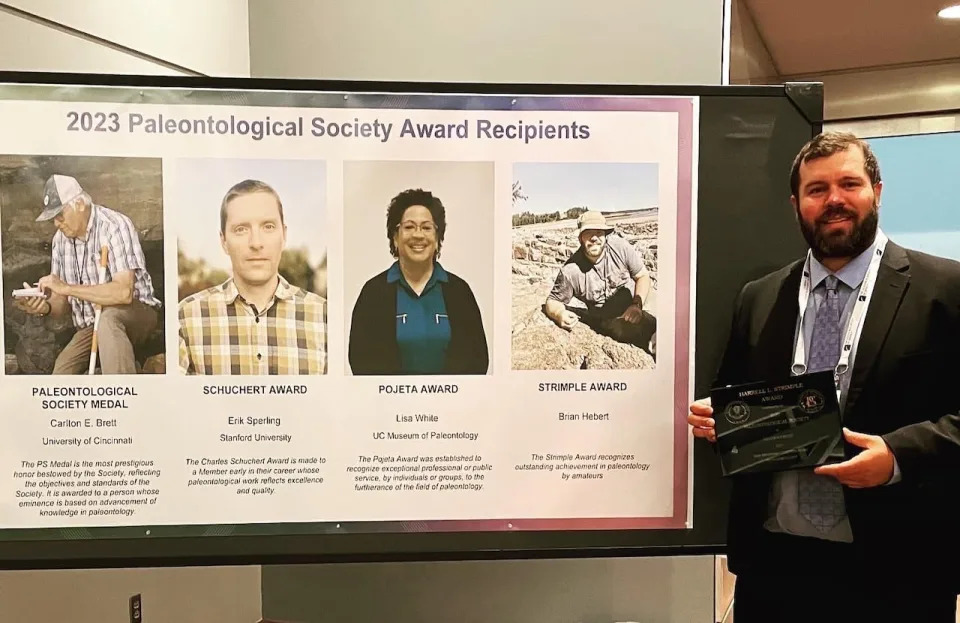CBC
Sun, November 19, 2023

In 2020, Brian Hebert discovered a 315-million-year-old reptile fossil in Nova Scotia. (Brian Hebert - image credit)
Brian Hebert's life changed in an instant while out for a walk with his father about 30 years ago.
While walking around the small town of Joggins, N.S., a UNESCO world heritage site along the Bay of Fundy, Hebert stumbled upon a fossil.
He was fascinated from that moment. He began visiting the local library everyday to scan through hundreds of scientific journals and fossilized records.
In October, Hebert, 44, received an international award when he attended the Geological Survey of America Conference in Pittsburgh. The Harrell L. Strimple Award is given to an amateur paleontologist for their contributions to paleontology.
Hebert is the first Nova Scotian to receive the award.
"It's a huge honour," he said. "People might not know how important the award is. In our world, it's the highest honour I'm ever going to get for paleontology."
In 2020, Hebert discovered a 315-million-year-old reptile fossil in Nova Scotia, which he called Dendromaia unamakiensis, meaning tree mother from Cape Breton. The discovery of an adult and baby reptile fossilized side by side was something nobody had ever seen before, he said.
'He's just remarkable'
John Calder, a Nova Scotian geologist, nominated Hebert after years of collaboration.
Calder met Hebert, then a teenager, while searching for fossils by the Joggins Cliffs. Calder had a conversation with him about paleontology and was struck with how knowledgeable he was.
"There's none like Brian," Calder said. "This gift to know where fossils might be is not chance discovery."
Hebert said a childhood friend reached out to him after the award was announced, saying people don't realize the hours that go into it.
"For a while it was going to school, coming home and then heading down to the beach to try to find something else," Hebert said.
Hebert said it takes a strong will to spend everyday exploring for rock formations, minerals or any signs of a potential fossil. He said he often didn't know if he would find anything, but that just made it fun.
'You're 12 years old and there's PhDs at your door'
A few years after their first encounter, Calder kept tabs on Hebert's progress. He recalled a time when he invited a visiting scientist from the United Kingdom to Hebert's home to see the prodigy's new discovery. Hebert presented the two men with a fossil wrapped in newspaper.
"He asked if we agreed with his preliminary identification that it was the skull roof of an ancient fish called haplolepis," Calder said.
"We didn't say anything, we just looked at each other, wide eyed, and then slowly turned our eyes back to Brian. Like, how did you know that?"
Calder said they were flabbergasted by the hypothesis and weren't sure if it was true.
"He was right," he said. "I don't know anyone else in the world that has this ability."
No comments:
Post a Comment